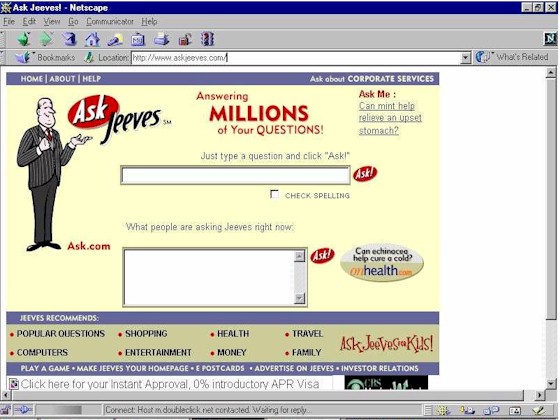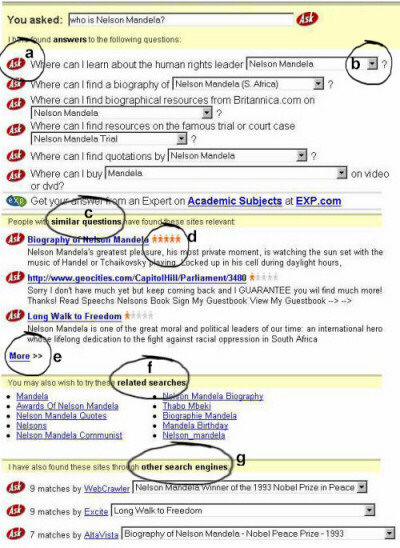| Searching for information with Ask Jeeves |
Still not sure what a search engine is? Click here to read a short explanation, before returning to this page. Let us suppose we have a list of questions that need answers, for example:
Lets look at the different ways in which the Internet can help us answer these questions. AskJeeves (http://www.askjeeves.com
Searching Using Ask JeevesJust so that you have a quick taste of what this search engine can do, let us try this simple search, using the question, "Who is Nelson Mandela?’ Step 1: Log onto the Internet. Step 2: Type in the address: http://www.askjeeves.com
Step 3: In the block indicated, type the question you want to ask Step 4: click on
Now let's do an example search, asking the question "Who is Nelson Mandela?" AskJeeves will take a short while to return to you with a result. The time you spend waiting depends on the quality of your Internet connection at the time, but you should not have to wait for more than a minute or so. Here is an example of the screen that AskJeeves presents to you in answering the question: Step 5: Below you will see an explanation about using Ask Jeeves, and what we see on the screen once it has given you a result to your question. Step 6: Click on the sites to read the information in each site. (Remember this can only be done when you are connected to the Internet).
Note (referring to the lettering in the above image): a
You click on b
The c AskJeeves offers you the answers it has given to similar questions asked by other people before you. You could explore these if they look valuable to you. d
AskJeeves also rates the popularity of the information source. For
example e If there is a longer list of sites that it offers, you should click on the More link. f AskJeeves also gives you links to information from related searches. g Lastly, AskJeeves searches some other popular search engines and gives you a summary of the results it found there. You could explore these as well. Unsuccessful result? If your initial question was not answered to your satisfaction, try to rephrase the question. AskJeeves has more than likely been put off track by a word that you used in the question. This word may have more than one meaning. Try to replace this word with a different one, or ask the question in a slightly different way. For example, you may get different results if you ask "Who is Madiba?" and "Who is Nelson Mandela?". Use the Web site evaluation form if you find useful sites. Click on the submit button below the form to share these websites with other educators. |


